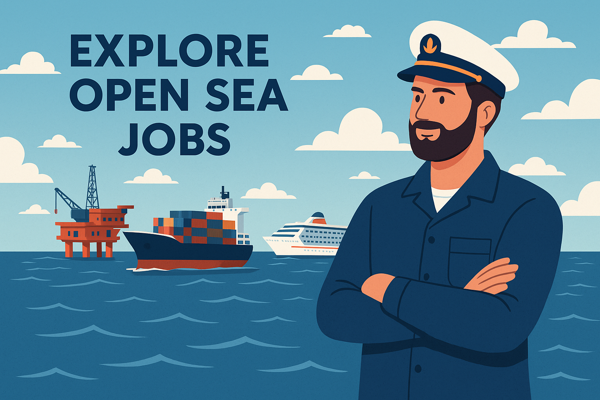The open sea has always held a special kind of allure—vast, unpredictable, and full of opportunities. For those seeking more than just a desk job, a career at sea offers adventure, growth, and a sense of purpose. Today, open sea jobs are more accessible than ever, attracting professionals from all walks of life. Whether you’re an experienced seafarer or someone considering this lifestyle for the first time, the maritime world might just be what you’re looking for.
Why Choose a Job at Sea?
Working on the open sea isn’t just a job—it’s a lifestyle. It means being part of an international team, experiencing the power of nature up close, and contributing to global trade and travel. Seafarers often describe their careers as deeply rewarding, thanks to the unique combination of high responsibility, independence, and the ability to see the world.
Jobs at sea also come with competitive salaries, long-term contracts, and the possibility of career growth. Many seafarers begin in entry-level roles and work their way up to senior positions on board, such as chief engineer or captain. The industry is known for valuing hands-on experience and dedication, making it ideal for those willing to learn and grow.
Who Can Work at Sea?
You don’t need to be born into a seafaring family to succeed in this industry. What matters most is motivation, discipline, and the readiness to adapt to life at sea. From cadets and junior electricians to oilers, cooks, and even fitness instructors—there is a wide variety of roles available, each playing a vital part in the smooth operation of a ship.
Many maritime companies, including those featured on wwcrew.com, offer training and clear pathways for newcomers. If you’re just starting out, you can apply for cadet programs or support positions and build your career from there.
What Kind of Ships Need Crew?
The global shipping industry is diverse, and so are the vessels. Depending on your interests and qualifications, you can work aboard:
- Cargo Ships: Transport goods across continents and are always in need of technical and deck crews.
- Tankers: Carry oil, gas, or chemicals and require specialized training.
- Passenger Ships: Cruise liners offer roles in hospitality, entertainment, and wellness in addition to marine operations.
- Fishing Vessels and Research Ships: Perfect for those with a passion for marine biology or oceanography.
- Offshore Platforms: Support oil and gas exploration and often need engineers, medics, and technical staff.
Each type of vessel comes with its own challenges and benefits. Some offer longer contracts with extended time at sea, while others follow a rotation system that allows for more regular time off.
Life On Board: What to Expect
Living and working on a ship requires resilience. Shifts can be long, and being away from home for weeks or months at a time is part of the job. However, modern vessels are equipped with comfortable cabins, gyms, recreational rooms, and even internet access to stay connected with loved ones.
Teamwork is essential. On board, your colleagues become your second family. Crew members often form close bonds, sharing meals, duties, and free time together. For many, this strong sense of community is one of the most rewarding aspects of the job.
How to Start Your Career at Sea
If you’re ready to take the plunge, the first step is to explore reputable job boards and crew agencies. Websites like wwcrew.com provide up-to-date listings for a variety of seafaring roles. You can filter jobs by vessel type, position, and contract terms, making it easier to find the right opportunity for your skills and goals.
Before applying, make sure you meet the basic requirements:
- Valid passport
- Basic safety training certificate (STCW)
- Medical fitness certificate
- Seafarer’s identification document (if required)
For some roles, additional technical or language qualifications may be needed. Don’t worry if you’re missing something—many training centers offer short courses to get you qualified quickly.
The Future of Open Sea Jobs
Despite the rise of automation and digitalization, the shipping industry continues to rely heavily on human expertise. Skilled and motivated crew members remain essential to ensure safety, efficiency, and compliance with international regulations.
Moreover, environmental concerns are leading to innovations in green shipping, opening new roles in environmental compliance and sustainable operations. This shift is creating even more opportunities for those who want to be part of the industry’s future.
Final Thoughts
Exploring open sea jobs means embracing a career like no other. It challenges you, teaches you resilience, and rewards you with experiences most people can only dream of. Whether you’re chasing adventure, looking for financial stability, or seeking a purposeful career, the maritime world is waiting.
Your journey begins with a single application—and the open sea may just become your future workplace.


